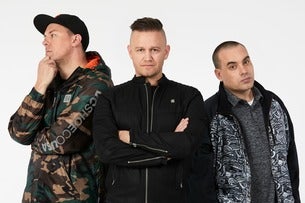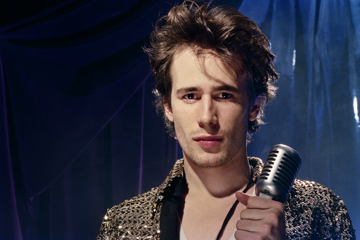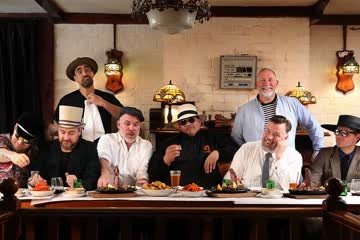How Hilltop Hoods Avoid Aussie 'Bogan' Hip Hop Stereotype
"There is a massive bogan stigma attached to the term ‘Aussie hip hop’."

Hilltop Hoods. Pic by Cole Bennetts.

We just make songs about whatever we’re feeling at the time and if the song is working then it makes the album, and the album is a collective of our lives in the last two years so it kinda is what it is,” says one third of Hilltop Hoods, MC Pressure aka Daniel Smith, about the group’s seventh album, Walking Under Stars.
Among the light-hearted offerings on Walking Under Stars – such as Cosby Sweater (which Hilltop Hoods’ current tour is named after) and The Art Of The Handshake (the writing of which involved researching different cultural meanings of handshakes and getting a guy from Vancouver to record informative voice-overs) – are songs about greed (Pyramid Building), Smith watching his son battle leukaemia (Through The Dark), and maintaining relationships while away on tour (Won’t Let You Down).
"When your son has cancer it doesn’t just affect him, or you – it affects a lot of people."
“The last album is definitely darker. It’s more brooding and more personal, I think, in general – not all of the songs but there’s definitely some very personal songs like [Through The Dark and Won’t Let You Down] and it’s been a bit more soulful than the last record as well,” says Smith.
“A lot of that came from my son’s illness. I spent six months in hospital with him, and a better part of the year helping him deal with his illness. That definitely changed the record and kind of made it that more dark, personal, brooding album that it is... When your son has cancer it doesn’t just affect him, or you – it affects a lot of people kind of in your very close personal circles, which [fellow Hilltop Hoods members] Suffa and Debris are, and it ended up affecting the album, I think.”
For many artists, the person who inspires a piece of work might not respond to that work in the way the artist hopes. That happened when Smith’s son, Liam, initially heard Through The Dark.
“He didn’t like it at first ‘cause it was too personal for him and it made it hard to listen to it. I know, right? It’s heartbreaking!” Smith lets out a little chuckle. “But after he heard it a few more times he was like, ‘Nah, it’s a great track’. He’s ten now, so he’s got all his own opinions and personal tastes in music and that and knows everything there is about everything in the world. The first time he heard [the track] I think it probably pulled back a lot of very hard to deal with memories. He’s in full remission, has been for over a year, so he’s doing great.”
With Hilltop Hoods having just returned from a 35-date, month-long tour in the States – performing in Europe for a month and New Zealand for two weeks prior to that, as part of their world tour – and now getting stuck into the Cosby Sweater Tour, which kicked off in Alice Springs and concludes in early December in Perth, no doubt Smith’s feeling the weight of being away from his partner and two kids. The poignancy of Won’t Let You Down seems relatable to any touring artists who have to leave loved ones for long stretches of time as part of their job.
“We’re talking about our fiancees, partners or wives, and straight up, it gets no realer than that. Sometimes in hip hop people are like, ‘Ah, you’re doing a love song?’ but fuck, why not? I’m comfortable with it. And that’s some real life shit that you have to deal with. It’s about difficulties of being a touring artist or being away for so long and trying to maintain a relationship with someone you love – and that’s real life and that’s what we’re about.
“It’s a bit easier in Australia because you get to come home for a few nights here and there between the weekends which you don’t get to do, obviously, when you’re overseas. But you know, it’s something that you have to work on always, forever, any relationship is – whether that’s with someone of the opposite sex, a friendship, your parents, your children, whatever – relationships need constant work.”
Don't miss a beat with our FREE daily newsletter
At least Smith’s partner’s reaction to Won’t Let You Down was better than his son’s reaction to Through The Dark – well, sort of. “She loved it, then she looked at me like, ‘So what are you apologising for, exactly?’ – like I’d done something she didn’t know about!” laughs Smith.
Although some of the songs on Walking Under Stars tackle heavier topics, it’s by no means a negative album; rather, an overall mood of optimism shines through. On top of that, it’s a distinctly personal album – not in that every track is autobiographical, but in that the personalities of the Hilltop Hoods guys permeate the record: what they stand for and what they do and don’t believe in. As all music diversifies, so too have we seen hip hop in Australia spiralling every which way – yet Hilltop Hoods have long solidified their presence within the scene without specialising in any certain areas (political and social issues, for example) or gimmicks, embodying a uniquely Australian sound while also keeping away from ‘Aussie hip hop’ stereotypes. It seems that racist and sexist content in music is criticised more widely than ever, with the internet providing a platform for more voices to speak out against such things.
“If you look for these things, you’ll find them in most genres of music – let’s start by saying that,” begins Smith. “Hip hop is an easy target because of the clichés that already exist; people are looking for it more. Having said that, these things do exist within it, but they’re not across the board. There’s so many different artists; it’s such a massive genre. It’s not like Australian hip hop is a genre of music – it’s not. I don’t even like the term ‘Australian hip hop’; it’s just hip hop. It’s from Australia but that doesn’t matter, it’s no different to the hip hop made in Britain or the US or any other Western, English-speaking countries in the world. There’s many different sub-genres and different personalities and things going on within our scene and other people’s scenes. A lot of people look at the American scene and go, ‘It’s misogynistic gangsta crap’ and yeah, some of it is, but not all of it... A lot of people don’t realise that the quality underground core exists and there’s a lot more good than there is bad, and it’s the same here.”
"It used to get called ‘skip hop’, and that’s even worse – I mean, that’s a racial slur. Why would you call a genre of music that?"
In the current landscape, it would be inaccurate to say that hip hop in Australia (and indeed, our country’s most successful/respected hip hop artists) consists of mostly white, 20-something, middle-class dudes rapping about partying and girls with varying degrees of offensiveness when artists like Briggs, Remi, Citizen Kay, Tkay Maidza, Jimblah (2007 recipient of the Hilltop Hoods/APRA Initiative) and Joelistics are all at the forefront of modern hip hop in Australia. But Smith thinks we’re not yet completely free of ‘bogan rap’ connotations.
“There is a massive bogan stigma attached to the term ‘Aussie hip hop’. And it used to get called ‘skip hop’, and that’s even worse – I mean, that’s a racial slur. Why would you call a genre of music that? And there is a big bogan factor attached to hip hop in Australia, which, I mean, we try and avoid as best possible. Some people make that lad hip hop, and that’s cool, if they wanna make that and they do it in good taste, good on ‘em. Some of ‘em do, some of ‘em don’t. But there’s so many other types of hip hop in Australia. You got hardcore dudes, you got commercial stuff, you got backpacker stuff – it’s not one genre, there’s so much going on in different scenes.
“Hopefully people are shifting away from the stereotype of bogan rap. And they are. There’s a lot of people mixing genres, there’s a lot of people playing a bit of electronic, a bit of dance, dudes doing more soulful stuff... There’s guys doing like political sort of hip hop. There’s so many good positive things going on it’s unfortunate that sometimes some [negative] things pop up in the media and the attention gets put on them.”








